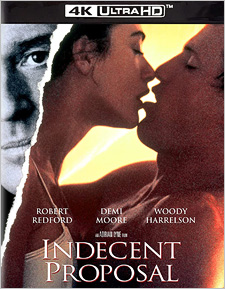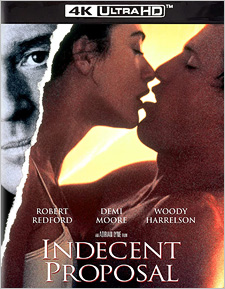Indecent Proposal (4K UHD Review)

Director
Adrian LyneRelease Date(s)
1993 (September 27, 2022)Studio(s)
Paramount Pictures (Kino Lorber Studio Classics)- Film/Program Grade: C
- Video Grade: A-
- Audio Grade: B+
- Extras Grade: C
Review
Indecent Proposal was a return to familiar territory for director Adrian Lyne in 1993. After having made a name for himself with lushly photographed, erotically-tinged hits like Fatal Attraction, 9 1/2 Weeks, and Flashdance, he took a slight detour with the psychological horror film Jacob’s Ladder in 1990. While the reviews were generally favorable, the box office wasn’t, so it’s not too surprising that he played it safe with his next project. Mind you, that depends on how you define the word “safe,” since the storyline for Indecent Proposal was guaranteed to generate some controversy. Of course, not all controversy is bad, at least from a perspective of box office receipts, and the buzz around Indecent Proposal did pay off with a $106 million domestic gross. That’s still less than Fatal Attraction had generated six years earlier, but it quadrupled what Jacob’s Ladder had done, so mission accomplished. (Lyne’s next film Lolita barely even got a North American theatrical release at all, but that’s a story for another time.)
There’s no doubt that Indecent Proposal has an irresistible hook: a billionaire (Robert Redford) offers a down-on-their luck couple (Demi Moore and Woody Harrelson) $1 million for one night alone with the wife. It’s the age-old question of whether or not everyone really does have their price, and if there’s any going back after having sold out. Needless to say, this particular iteration of that question adds some unavoidably distasteful elements of its own, but it’s a storyline that certainly got people talking back in 1993.
The screenplay by Amy Holden Jones was inspired by the 1988 novel by Jack Engelhard, although she jettisoned nearly all of the book’s plot and characters and built her own story around the core concept. Her take is more of a fairy tale, especially as filmed by Lyne, although it’s definitely one that’s more in keeping with the Brothers Grimm. The contract between the couple and the billionaire is really a Faustian bargain, and they’re definitely risking their own souls in the process. That said, there’s not a lot of depth in the way that the film actually examines all of the implications of the central situation, and it timidly retreats back from Brothers Grimm territory to supply the requisite happy ending. Contrary to what some people may think, Indecent Proposal is anything but offensive. It manages to play things safe with its potentially unsafe storyline—it’s just too shallow to be offensive. It’s a glossy but ultimately hollow look at otherwise provocative material.
Cinematographer Howard Atherton shot Indecent Proposal on 35 mm film using Panavision cameras with spherical lenses, finished photochemically, and framed at 1.85:1 for its theatrical release—though like previous home video versions, it’s been slightly reframed here at 1.78:1. (A handful of shots used 16 mm instead in order to facilitate some handheld camerawork in narrow spaces.) Paramount provided this new 4K master to Kino Lorber, though they didn’t provide any specific details about it, other than the fact that it’s been graded for high dynamic range (HDR10 and Dolby Vision options are included), and that it was approved by Adrian Lyne. Presumably, it’s a scan from the original negative, but the nature of the cinematography means that it’s never going to be the last word in fine detail. In keeping with the fairy tale nature of the story, Atherton often used light diffusion filters to give things a slightly hazy, dreamy look. While there’s little information available regarding his work on the film, it appears that he may have applied a bleach bypass process to some or all of the negative—much of the film has the characteristic silvery, glowing look that the process can impart. All of that impacts the amount of detail that’s available, regardless of source or scanning resolution. That said, everything looks as detailed as it can, with little to no signs of damage. The grain is fine, and the encoding manages it well, though it varies slightly from shot to shot. Paramount has been guilty recently of using Digital Noise Reduction to eliminate all grain and then adding a layer of artificial grain to replace it, but in this case, it would be difficult to determine the difference. (Although the inconsistencies would seem to indicate that they didn’t.) Colors all look accurate, and the contrast range is solid—this HDR grade is very restrained, though it may have been used to enhance that glowing look a bit. It’s not a dazzling transfer, but it seems like it’s faithful to the intentions of both Atherton and Lyne. Most importantly, it’s a massive upgrade over the previous Blu-ray, which used an outdated master.
Audio is offered in English 5.1 and 2.0 DTS-HD Master Audio, with optional English subtitles. Indecent Proposal was released in Dolby Stereo, so the 2.0 track is a matrixed four-channel mix. The 5.1 track is primarily a discrete encoding of those four original channels, though there may have been some decorrelation applied to the surrounds to simulate split channels. Since the bulk of the mix is focused on the front channels, there’s not a huge difference between the two, but the surrounds do seem to be set at a higher level in the 5.1 version, making it feel a bit more enveloping simply because they’re louder. Either way, the dialogue is always clear, and most importantly, the lush score from John Barry sounds wonderful.
Kino Lorber’s 4K Ultra HD release of Indecent Proposal is a two-disc set that includes a 1080p Blu-ray copy of the film, as well as a slipcover that duplicates the theatrical poster artwork from the insert. The following extras are included:
DISC ONE: UHD
- Audio Commentary by Adrian Lyne
DISC TWO: BD
- Audio Commentary by Adrian Lyne
- Trailer (HD – 2:15)
- Tell Them Willie Boy Is Here Trailer (SD – 2:52)
- Legal Eagles Trailer (SD – 1:52)
- Havana Trailer (SD – 5:23)
- The Scarlet Letter Trailer (SD – 3:16)
- Play It to the Bone Trailer (SD – 2:23)
- Foxes Trailer (SD – 2:11)
The commentary was originally recorded for the 2002 DVD release of the film, and even with that having been only ten years down the road at that point, Lyne admits up front that he might not remember everything very well. There are frequent gaps where he lapses into silence, and many of his comments are simply pointing out things that he likes. He also offers some interesting tidbits about the choices that he made, and a few production stories as well, but there’s a lot of filler between those moments. It’s definitely a commentary for dedicated fans of the film only.
Actually, that may be true of the disc as a whole. Any home video release of Indecent Proposal isn’t necessarily going to have wide appeal at this particular point in time. It was a divisive film in 1993, and the central story is no less polarizing now. If you’re a fan, this is undoubtedly the definitive presentation of the film, and it’s a worthy replacement for the existing Blu-ray. If you’re not, the improvements in the video might not be quite enough to change your mind about the film. Regardless, it’s still wonderful to see Paramount partnering with Kino Lorber to release more of their catalogue titles on UHD—more 4K is always welcome.
- Stephen Bjork
(You can follow Stephen on social media at these links: Twitter and Facebook.)

